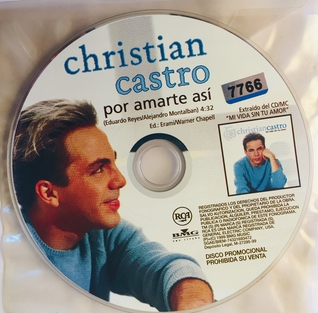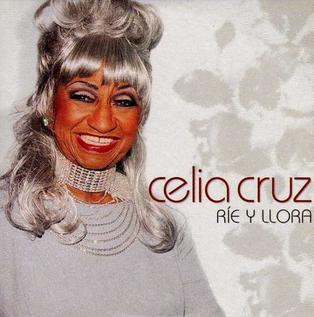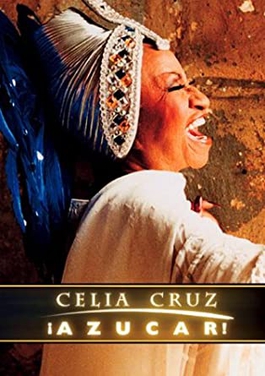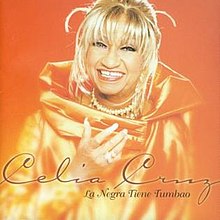
Úrsula Hilaria Celia de la Caridad Cruz Alfonso, known as Celia Cruz, was a Cuban singer and one of the most popular Latin artists of the 20th century. Cruz rose to fame in Cuba during the 1950s as a singer of guarachas, earning the nickname "La Guarachera de Cuba". In the following decades, she became known internationally as the "Queen of Salsa" due to her contributions to Latin music. She had sold over 10 million copies, making her one of the best-selling Latin music artists.

"No Me Ames" is a Latin pop duet recorded by American singers Jennifer Lopez and Marc Anthony for Lopez's debut studio album, On the 6 (1999). It is a Spanish cover version of the Italian song "Non Amarmi", written by Giancarlo Bigazzi, Marco Falagiani and Aleandro Baldi and recorded by Baldi and Francesca Alotta for Baldi's album Il Sole (1993). The song was translated into Spanish by Ignacio Ballesteros at Anthony's request. Two versions of the song were produced for On the 6; one as a ballad and the other as a salsa. The ballad version was produced by Dan Shea, while the salsa version was arranged and produced by Juan Vicente Zambrano. The music video was directed by Kevin Bray and received a Latin Grammy nomination for Best Short Form Music Video. It served as the encore during the couple's co-headlining tour in 2007.

The 3rd Annual Latin Grammy Awards were held in Los Angeles at the Kodak Theatre on Wednesday, September 18, 2002. Alejandro Sanz was the night's big winner, winning a total of three awards including Album of the Year. The ceremony returned in style after the 2001 ceremony was cancelled because of the September 11, 2001 terrorist attacks across America, and all presenters apologized to viewers during the broadcast for such.

Todo a Su Tiempo is the second studio album by American recording artist Marc Anthony, released by RMM Records on May 31, 1995. The album was produced by Sergio George, who was also involved with production of Anthony's debut studio album, Otra Nota. The album comprises five new compositions, three of which were written by Omar Alfanno, and four cover versions. Eight singles were released from the album, all but one of which topped the Billboard Tropical Songs chart.

Luis Enrique Mejía López is an Nicaraguan-American singer-songwriter and composer. He is known as "El Príncipe de la Salsa". A grammy-award-winning artist, he has released over 20 albums and achieved widespread success, including his single "Yo No Sé Mañana" which was awarded a Latin Grammy Award for "Best Tropical Song".

Regalo del Alma is the final studio album recorded by Cuban salsa recording artist Celia Cruz, released posthumously on 29 July 2003 by Sony Music Latin, following Cruz's death from brain cancer on July 16, 2003. It is Cruz's seventieth album.

"El Amor" is a song by Puerto Rican singer Tito El Bambino. It was composed by Tito and Joan Ortiz and released on February 9, 2009, as the second single from his third studio album, El Patrón (2009). The song blends the sounds of Latin pop with cumbia and merengue. A regional Mexican and a salsa version were recorded and included on the special edition of the album.

"Por Amarte Así" is a song written by Alejandro Montalbán and Eduardo Reyes and performed by Mexican recording artist Cristian Castro. It was produced by Kike Santander and released in 2000 as the fourth single from his sixth studio album Mi Vida Sin Tu Amor (1999). Lyrically, the song is about a man who promises to keep loving his lover even though she is gone. In the United States, it peaked at number three and two on the Billboard Hot Latin Songs and Latin Pop Songs charts and received a Billboard Latin Music nomination for Pop Track of the Year. "Por Amarte Así" was the fifth best-performing Latin single of 2001 in the United States.
Fernando Osorio is a singer-songwriter, born in Bogotá, Colombia, and raised in Caracas, Venezuela.

Celia Cruz and Friends: A Night of Salsa is a live album by Cuban salsa musician Celia Cruz. The album was recorded during a concert on May 12, 1999, in Hartford, Connecticut, which was broadcast by PBS. Among the participants of the concert were Tito Puente, Johnny Pacheco, La India, and Isidro Infante. The album peaked at number twelve on the Billboard Tropical Albums chart. The album received a Latin Grammy Award for Best Salsa Album and a nomination for Tropical Album of the Year at the Lo Nuestro Awards of 2001.
The Lo Nuestro Award for Tropical Album of the Year is an honor presented annually by American television network Univision at the Lo Nuestro Awards. The accolade was established to recognize the most talented performers of Latin music. The nominees and winners were originally selected by a voting poll conducted among program directors of Spanish-language radio stations in the United States and also based on chart performance on Billboard Latin music charts, with the results being tabulated and certified by the accounting firm Deloitte. However, since 2004, the winners are selected through an online survey. The trophy awarded is shaped in the form of a treble clef.
"La Vida Es Un Carnaval" is a song performed by Cuban recording artist Celia Cruz. The song was written by Victor Daniel, produced by Isidro Infante, arranged by Isidro Infante and released as the lead single from Cruz's studio album Mi Vida Es Cantar (1998). The song won the award for Tropical Song of the Year at the 2003 Lo Nuestro Awards.
Mikey Perfecto, is a Puerto Rican reggaeton recording artist. He was first thrust into the music scene as the lead vocal, leader, and songwriter for the Latin urban music group, 3-2 GET FUNKY. With 3-2 Get Funky, Mikey Perfecto recorded 5 studio albums from 1993 to 1998. He recorded his first solo album in 1999, "Angel Perdido", a mixture of salsa, hip hop, and reggaeton urban music. His second studio album Evolucion Arrestada (2004) reached number nineteen on the Billboard Tropical Albums chart. The lead single "La Matadora" featuring fellow recording artist Daddy Yankee reached number thirty-five on the Billboard Tropical Songs chart. Perfecto was featured on Cuban singer Celia Cruz's 2002 hit single "La Negra Tiene Tumbao". It reached number thirty on the Billboard Latin Songs chart and number four on the Billboard Tropical Songs chart. The song received nominations for Record of the Year, Song of the Year, and Music Video of the Year at the Latin Grammy Awards of 2002. The parent album won the Latin Grammy Award for Best Salsa Album. It was nominated for Album of the Year. The song was also nominated Tropical Song of the Year at the 2003 Lo Nuestro Awards. Mikey Perfecto whose real name is Miguel Angel Soto Cordova, obtained a master's degree in Social Work and a post-master's degree in Clinical Social Work from the Doctorate Program of the Interamerican University Of Puerto Rico. He is the author of the Book "En Cuerpo y Alma" where he details his struggles and challenges during the first wave of Puerto Ricos’ urban artist movement. He currently works with troubled youth, and communities afflicted by poverty, addiction, and other obstacles produced by these conditions.
"Quimbara" is a song performed by Cuban recording artist Celia Cruz and Dominican recording artist Johnny Pacheco. The song written by 20 year old Junior Cepeda from Puerto Rico, was released as the lead single from Cruz and Pacheco's joint studio album Celia & Johnny (1974).

"Ríe y Llora" (English: "Laugh and Cry") is a song performed by Cuban recording artist Celia Cruz. The song was written by Sergio George and Fernando Osorio, produced by George and released as the lead single from Cruz's final studio album Regalo del Alma (2003) on 12 July 2003. It was the final song recorded by Cruz, following being sidelined by a brain tumor and before her death on 16 July 2003.

"Ella Tiene Fuego" (English: "She Has Fire") is a song performed by Cuban recording artist Celia Cruz. It features Panamanian recording artist El General. The song was written by Sergio George and Fernando Osorio, produced by George and released as the second single from Cruz's final studio album Regalo del Alma (2003) on 20 December 2003.

¡Celia Cruz: Azúcar! was a tribute special held in honor of Cuban performer Celia Cruz. It was hosted by American singer Marc Anthony and Cuban-American singer Gloria Estefan. It featured musical performances by various Latin music and Anglo performers including Victor Manuelle, Paulina Rubio, José Feliciano, Milly Quezada, Los Tri-O, Gloria Estefan, Patti LaBelle, Arturo Sandoval, Ana Gabriel, Gilberto Santa Rosa, Tito Nieves, Albita, Johnny Pacheco, Alfredo de la Fe, Alicia Villareal, Olga Tañón, Mikey Perfecto, José Alberto "El Canario", Rosario, Luis Enrique, Marc Anthony and Gloria Gaynor. This was Cruz's final public appearance, before her death in July 2003. The tribute concert raised $145,000 for the Celia Cruz Foundation.

"La Negra Tiene Tumbao" (English: "The Black Woman's Got Style") is a song performed by Cuban recording artist Celia Cruz. It features rap vocals performed by Mikey Perfecto. The song was written by Sergio George and Fernando Osorio, produced by George and released as the lead single from Cruz's fifty-ninth studio album La Negra Tiene Tumbao (2001).

Hits Mix is the first remix album by Cuban recording artist Celia Cruz. It featured two singles, a Spanglish remix version of "La Negra Tiene Tumbao", entitled "Gotta Get Down" and a dance remix of "Yo Vivire ".

Aymée Regla Nuviola Suárez is a Cuban singer, pianist, composer and actress, nicknamed "La Sonera del Mundo". She is also known for having played Celia Cruz in the Colombian telenovela Celia.















